
A Flinders University research project trying to find a solution to chronic pain will take another step forward after receiving just under a million dollars in the latest round of the National Health and Medical Research (NHMRC) Development Grant scheme.
Led by Flinders University Professor Stuart Brierley and Professor Glenn King from the University of Queensland, the project aims to test the effectiveness of a drug derived from spider venom on pain caused by irritable bowel syndrome.
“Irritable Bowel Syndrome (IBS) is a leading cause of chronic pain, both world-wide and in Australia, but lacks effective treatment,” says Professor Brierley, NHMRC Investigator Fellow and Director of the Visceral Pain Research Group within the College of Medicine and Public Health at Flinders University and based at the South Australian Health and Medical Research Institute (SAHMRI).

“My previous research has shown chronic pain arises from nerve fibres in the colon which fail to ‘reset’ back to normal following inflammation or infection, while Professor King has been working on developing drug treatments derived from spider venoms”.
“This project will continue our work together, investigating the best way to target these pain sensing nerve fibres using new venom derived peptides as novel drug treatments and find the best way of providing pain relief for those managing IBS.”
The research project titled ‘Developing a first-in-class therapeutic for chronic visceral pain using venom derived peptides’ has been funded $998,858.88 for three years as part of the NHMRC’s 2021 Development Grant round.
The grants will support researchers undertaking health and medical research within Australia at the proof-of-concept stage whose projects show potential for a commercial outcome within a foreseeable timeframe. 19 projects overall were funded by the federal government for a total of more than $15 million. A full list can be found here.

